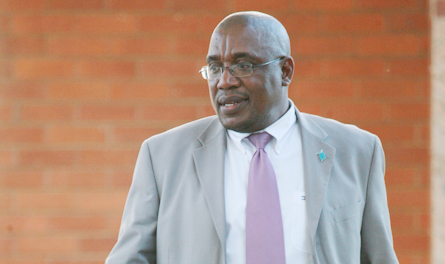Was the Assistant Minister of Finance and Development Planning, Vincent Seretse a public servant or not when he was the chief executive of Botswana Telecommunications Corporation.
This is one of the key issues which arose during arguments before the Corruption Court on Friday.
The former chief executive of BTC is facing two counts of abuse of office when he was BTC’s Chief Executive Officer in 2008, and for taking part in awarding a tender to a company called Serala which he allegedly had interests in.
The State alleges that on or about 14th day of February, 2008 in Gaborone, whilst a BTC employee and whilst a referee to Serala (Pty) Ltd, with which BTC proposed to deal with, he allegedly failed to disclose the nature of his interest in that company and knowingly participated in the proceedings of the BTC Board meeting relating to the awarding of tender to Serala.
It is also alleged that on 5th March of the same year, he allegedly abused the authority of his office, knowingly and without lawful authority, allegedly directed two employees of BTC to recruit eight BTC employees to offer their services to Serala.
Seretse’s co-accused, Paul Paledi, a Director of Serala, is facing a single count of giving false information to a public servant.
Last Friday, Seretse’s advocate, Mike Hellens, Senior Counsel from the Johannesburg Bar submitted before the Corruption Court that his client was not in a position to take a plea because the State did not provide sufficient information.
Advocate Hellens asked the State to explain how Seretse was a public servant when he worked for BTC. The defence argue that an employee of Botswana Telecommunications Corporation did not fall within the list of public servants under the Penal Code.
The Judge said; “I spent the whole day trying to understand why a person employed by BTC becomes a public officer.”
In response, the State Attorney, Ditodi Ditodi said that the law was clear under Section 2 of the Penal Code and other related legislation as to who is a public officer and who should be regarded as being employed in the public service. The State added that they would during trial call people from BTC office to testify that they were public servants.
The defence also asked the State to disclose the exact date that Seretse is alleged to have participated in the proceedings of the said Board meeting and to also vanish them with the minutes of that meeting.
On his response, Ditodi stated that the meeting was on or about February 28, 2008.
The state was also taken to task to explain what they meant by the phrase, “whilst Seretse was a referee to Serala.” The defence stated that they wanted to know what a referee Seretse was; it doesn’t seem in terms of the law a person who is a referee to anything can have interest in it. “What is this referee that makes an interest in a company?” asked the defence.
And Justice Tshepho Motswagole seemed to agree with him as he said, “as a person analyses the charge, they should also look at the section involved. The section sets out different circumstances on which an offence will be committed.”
But Ditodi’s answer was that the statement was not rhetoric declaration but a self explanatory statement which needed not be constructed in any other approach. He said evidence will be led during trial and the defence will get to know the interest they were alleging.
Meanwhile, ruling will be delivered on February 28, 2014.

